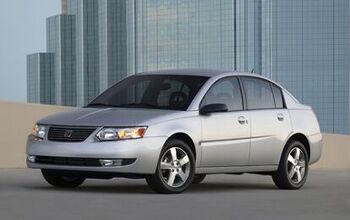GM And Toyota. A Tale Of Two Losers

General Motors hasn’t made money on its core auto business since 2004 – and did nothing. Same cars, same talk, same mismanagement. GM is in the government’s intensive care, hangs on a the tax payer’s money drip, and still hasn’t changed.
Contrast that to Toyota. Toyota will announce its first operating loss in its history – approx $1.6b, less than GM’s monthly cash burn – and Toyota went to battle stations months before the announcement.
Toyota does everything GM failed to do. They changed the management. Akio Toyoda, grandson of the founder, will take over as president. Even before he’s officially taking the job, Toyota “appears ready to overhaul its entire operations, from development to production to its sales network,” the Nikkei (sub) reports. Nothing is sacred. Plants are idled worldwide. Output is slashed. A few days ago, the company held a meeting in Nagoya that was attended by 1,000 representatives from Toyota dealerships across the country. Toyoda made it clear that he would not hesitate to drastically revise the firm’s domestic sales structure. And that’s just the beginning. More drastic moves are afoot.
Toyoda has created a team of employees charged with devising new corporate visions, including making decisions on future domestic and overseas lineups, production system and sales networks.
While GM is painting rosy pictures about pent-up demand and sales which will soon rebound, Toyota is preparing for the worst.
Total global output capacity for all carmakers is 100m units a year. Actual demand is estimated at about 60 million cars worldwide. According to industry figures, capacity utilization below 80 percent spells trouble. With capacity utilization of 60 percent (and falling) the world’s auto industry is in deep trouble. Again, Toyota alone has excess capacity of more than a million units.
While GM was betting on SUVs and available credit, Toyota aims to take the lead in the industry by introducing not only the most environmentally friendly cars but also budget vehicles for emerging countries and (yes) slick models that can spark young people’s interest in cars.
While GM was fleecing its suppliers and even drove its own Delphi into bankruptcy, Toyota is worried about the health of its suppliers. Toyota has conducted an emergency poll of around 50 parts suppliers, to grasp their fundraising situations. The upshot is that their financial health is rapidly worsening. “We will possibly need to help them secure necessary funds,” said Senior Managing Director Atsushi Niimi, who is in charge of procurement.
While GM coddled the UAW, Toyota slashed most temporary workers, and may let unionized workers go also.
Toyota officially replaced General Motors Corp. as the world’s No. 1 automaker in 2008. At Toyota, this is already regarded as an embarrassing non-event. Everybody knows that the reason is GM’s poor performance, rather than Toyota’s strong results. There were no celebrations at Toyota. Actually, it is an irritation. As the Nikkei says: “Staff are simply left without a new goal to shoot for and a bit weary from frequent changes in production schedules. To raise the morale of its people and suppliers, Toyota needs a new goal other than just “growing bigger” or “becoming No. 1.”

Bertel Schmitt comes back to journalism after taking a 35 year break in advertising and marketing. He ran and owned advertising agencies in Duesseldorf, Germany, and New York City. Volkswagen A.G. was Bertel's most important corporate account. Schmitt's advertising and marketing career touched many corners of the industry with a special focus on automotive products and services. Since 2004, he lives in Japan and China with his wife <a href="http://www.tomokoandbertel.com"> Tomoko </a>. Bertel Schmitt is a founding board member of the <a href="http://www.offshoresuperseries.com"> Offshore Super Series </a>, an American offshore powerboat racing organization. He is co-owner of the racing team Typhoon.
More by Bertel Schmitt
Latest Car Reviews
Read moreLatest Product Reviews
Read moreRecent Comments
- ToolGuy I am slashing my food budget by 1%.
- ToolGuy TG grows skeptical about his government protecting him from bad decisions.
- Calrson Fan Jeff - Agree with what you said. I think currently an EV pick-up could work in a commercial/fleet application. As someone on this site stated, w/current tech. battery vehicles just do not scale well. EBFlex - No one wanted to hate the Cyber Truck more than me but I can't ignore all the new technology and innovative thinking that went into it. There is a lot I like about it. GM, Ford & Ram should incorporate some it's design cues into their ICE trucks.
- Michael S6 Very confusing if the move is permanent or temporary.
- Jrhurren Worked in Detroit 18 years, live 20 minutes away. Ren Cen is a gem, but a very terrible design inside. I’m surprised GM stuck it out as long as they did there.


































Comments
Join the conversation
Let's add some facts... 1. Management change? Aside from the new CEO, where are the big changes at Toyota? Ah, that's right, they got new US leadership--after Jim Press left for Chrysler. And he got HIS promotion after his predecessor resigned after allegations he sexually harassed his secretary. GM has been slimming down, cutting white-collar staff, and moving new people into leadership positions for three years. 2. Take a moment and read the plan submitted to Congress in December (it's out there on the Interwebs). Additional dealer cuts, bonus elimination, brand consolidations, staffing cuts--it's all there. And Toyota only met a couple of days ago to address this? 3. As far as big trucks and SUVs, Toyota built a brand-new, huge plant in Texas designed to build nothing but large, gas-guzzling SUVs and pickups. No diesels, by the way, or hybrids to help fuel economy--and the plain old gasoline models get worse fuel economy than Ford or GM. Why did they do this? The same reason Detroit did--it's where the money is. 4. Toyota's Kentucky workers make $2 an hour more than their UAW counterparts. I hardly consider that "coddling." The cost issues associate with the UAW are based on legacy costs and employees. 5. Toyota has been slow to develop cars for emerging markets, where GM is outselling them in many countries with a wider choice of vehicles; Toyota's emerging market vehicles are limited now to (surprise) SUVs and MPVs. They are #3 in China behind GM and VW, and they won't have a small car for India until 2010, a year after GM.
@ adb12 1. I'm not sure why we need the sexual scandal element, but the response is that Toyota people are not rewarded year after year for failure. Actually, that question has never come up. The first time it did, many are moving aside. Toyota executive compensation is extremely modest by international standards. Wagoner et al and the Board of Bystanders (copyright Farago) have so far refused to move on. 2. The GM restructure plan submitted to Congressional hearings had them still insolvent at ~12m SAAR after 2 years. It was a plan drawn up in a single month which Wagoner admitted was more drastic than they ever thought would be required. It was in response to Congressional demands (and a statement of the plainly obvious) that whatever "plan" they had prior to requesting government help wasn't working. (See Point 1 - management should resign en mass). 3. Internally Toyota are disappointed with Tundra. They won't make the mistake again. They will salvage what they can from that plant, perhaps it's designed cleverly and can be converted quickly to something else. 4. That's great news for GM then. Why are they still losing money again? 5. Toyota's organic growth in every market they operate in since the mid-1960s onwards and GM's market share decline at around the same time would seem to indicate the opposite of your point. Or as another poster famously put it "We loose money on every sale, but make up for it in volume".